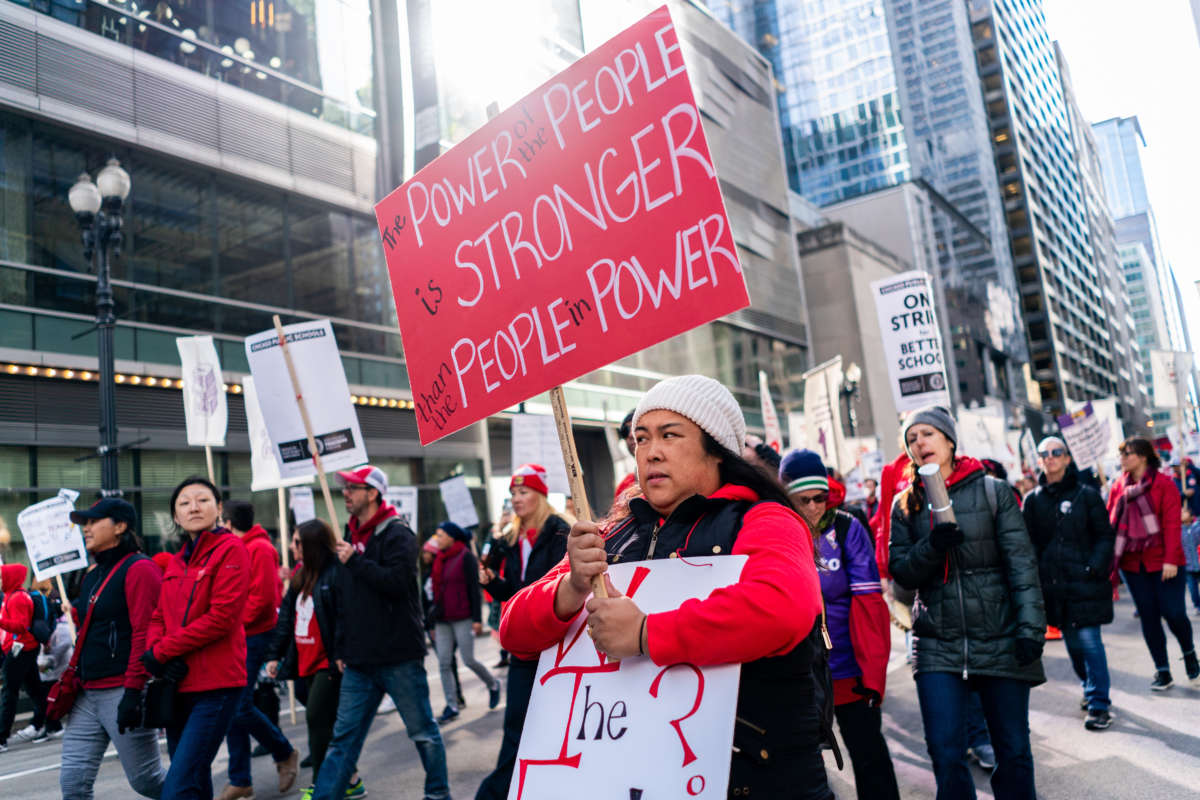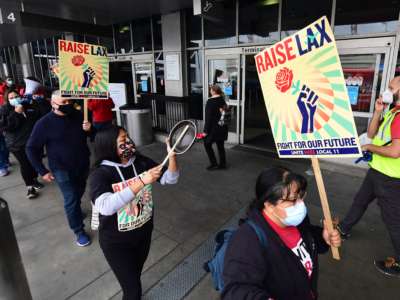
BY: Colin Barker, Haymarket Books

PART OF THE SERIES
Progressive Picks
Colin Barker, a leading British Marxist intellectual, died in 2019 before the publication of his final work, Revolutionary Rehearsals in the Neoliberal Age, in 2021. This extraordinary volume, published by Haymarket Books, examines the processes and outcomes of mass uprisings between 1989-2019 in Central Europe and Eastern Europe, South Africa, Sub-Saharan Africa, Indonesia, Bolivia, Latin America and Egypt.In this excerpt from the chapter titled “Social Movements and the Possibility of Socialist Revolution,” Barker discusses the strategic barriers which movements must overcome in order to “break out beyond the anticipated script” of isolation, compromise, demoralization and defeat.
The key organising focus of any new left movement in the future may not be the workplace, though it will — somehow — necessarily have to confront and defeat boss power at work; otherwise a whole part of life experience (which actually absorbs more of the time and energy of working people now than it did in the previous generation) will be untouched by movement impulses. And it will have to find ways to get beyond a series of barriers that, up till now, have mostly contained and constrained the movements of recent decades.
The first of these is the isolation of movement activity to particular social sectors or geographical locations. This may be institutionalised […] and in the practice of classic social democracy, which reserved “political struggle” for the parliamentary party and “economic struggle” for the unions. In Argentina the movement of workers in the “recovered factories” was barely connected to workers in “regular employment” where Peronist unionism acted as a restraint on solidarity. The “Oaxaca commune” of 2006 was — rather like the earlier Paris Commune — restricted to a particular city and region, and thus open to eventual defeat by organised state power. The difficulty is to find ways to express cross-movement solidarity in action. Here strategic questions arise. In Argentina, the Peronist unions held back workers’ struggle in 2001, yet they could not just be “written off.” Ordinarily, as they have demonstrated on several important occasions over the past decade and more, Argentinian unions have a capacity to mobilise many more forces than does the (very fragmented) left in all its forms. As elsewhere, the problem is to convert unions into fighting organisations with a wider and more transformative perspective than their incumbent bureaucracies. That, after all, was the underlying secret of the Chicago Teachers’ victories: an organised left caucus won their union membership to a more vibrant and democratic vision of the very meaning of their union, one that meant reaching out to their students and their parents in a common struggle for the future, not just of teachers’ pay and jobs, but of education itself. In short, just as “isolation” is not a natural or inevitable conditions, but depends on a definite politics, so combating it calls for a different politics. Further, the nature of that “different politics” itself requires critical exploration. A radical politics that relies, for example, on pre-existing “identities” (for example, a narrowly conceived “class membership” or “racial / gender solidarity”) is liable to miss both the actual differentiations in experience among those assumed to share the same identity and the real potentials for “cross identity” solidarity among those who share similar problems: Mistaken theory and practice on the left can itself contribute to maintaining the isolation of movement sectors.

Secondly, there remains a problem with a century-long history: in countries where parliamentary democracy allows the possibility of the election of “left governments,” what is — and what can be — the relationship between such governments and popular movements? Does the pursuit of parliamentary office ever aid or always hinder the aim of radical emancipation? The question has assumed some prominence in recent years, notably with respect to the “Pink Tide” governments of Latin America, the Syriza government in Greece and the prospects for new left parties like Podemos in Spain. Is the very existence of parliamentary government an inherent and impassable barrier to social revolution?
Experience to date has not been encouraging to those who seek to combine left parliamentary government with social movements as a route to social transformation. In Latin America, as Jeff Webber, Jorge Sanmartino and others have stressed, popular movements in 2000-2005 placed an emphasis on mass direct action, grassroots popular democracy often in assembly form, and the “de-professionalisation” of politics. The popular organisations they built combined confrontation with the state with the development of new forms of governance-from-below that seemed to “prefigure” a post-neoliberal and even anti-capitalist society that many in their ranks aspired to build. However, the initiative in these movements passed to a series of more or less progressive governments, who drew on the movements’ energy to get into office but simultaneously limited those movements to “subaltern participation,” defined as the pacifying incorporation of popular sectors into the gears of the capitalist state. Movements’ capacity for further development of their autonomous and antagonistic confrontations, and therefore also for the further development of alternative visions, has been contained and reduced as they have been “domesticated.” None of the left governments managed to alter the underlying pattern of capital accumulation they inherited. Especially once the global economic crisis began to be felt directly in the region, and leftist governments began cutting public spending and services, a space has emerged for some resurgence of the right. In Greece, where there was no ballast of raw materials exports to stabilise the crisis, the Syriza government simply gave in dramatically to the demands of the “Troika,” leaving the movements that had put it in office betrayed and disoriented.
It remains a possibility that a pathway to a revolutionary reconstitution of society might begin with the election of a left government to parliament. But any such left government would be placed under immense pressure to contain its supporters’ hopes and demands, and to evade efforts to control it from outside and below. Were it — against previous form for such governments — to promote further radicalisation of movements, it would provoke a full-scale crisis with capitalist power. In such conditions, any beginning with elections would transform quite rapidly into a very different situation of direct confrontation between movements and capitalist power, involving major ruptures and the splitting of political forces, more akin to a revolutionary situation than to “normal politics.” At the heart of any such situation would be a critical question: Do those in government (as is likely) seek to temporise with capital and to demobilise the popular forces, or do they contribute to developing the means and the popular will to carry movements’ own power forward, laying new and broader bases for a wider emancipation? In such a scenario, any value a left government might have would be outweighed by a developing popular insurgency. Elections, whether of presidents or governments, happen. For movements, the question that really matters at such moments is whether they focus on their own self-developing projects and their own self-organisation, or allow their own self-diminution and disabling by others’ priorities.
There is a third barrier, noted by several of our authors. While we have witnessed widespread and active resistance to the priorities imposed by neoliberal states, that resistance has, to date, also been marked by the weakness of alternative projects based on enlarging emancipation and democratic control. It’s not that they have been completely absent, but they have seemed underdeveloped and only partially articulated, in part because of the sectoral isolation previously noted, and in part because old languages of liberation are no longer trusted and new ones still await their crafting. Small coteries may be rehearsing them, but their flowering depends on new popular upsurges that affirm their relevance. If, across Latin America, where many of the impulses of the early 20th century were felt most strongly, the “cycle of revolt” is now in decline, local questioning and reformulation are as likely as an immediate explosion. As Raúl Zibechi commented: “When major historical processes come to an end, and in turn major political defeats transpire, confusion and despondency set in, desire intermingles with reality, and the most coherent analytical frameworks blur.” The struggles of the past two decades posed questions and suggested partial answers that will remain part of activist milieux as topics for debate and development. One key idea, taking partial shape in popular movements across several continents, and now awaiting its next development was that movements’ own self-generated organisations and practices can and should provide the basis for the constitution of society, economy and politics. It’s not likely we have heard the last of that idea.
Fourthly, that idea requires political embodiments in the shape of organisations, networks and coalitions which take “emancipation from below” as their underlying principle. It’s difficult to foresee the forms that such bodies might take, and how they might emerge to claim some kind of hegemony within movements. Those who already recognise the practical need for them require healthy doses of modesty and openness to diversity of expression if they are to make headway.
Finally, if the Bolsheviks in 1917 were already clear that their own revolution could only succeed if it spread, the further development of global capitalism in the past century has only reinforced that notion. “Socialism in one country” was always a reactionary as well as a utopian idea. But how might practical internationalism be promoted today? In a decade when the inherently global threat of climate change has become ever more prominent, and when millions of migrants and refugees are forced to flee new apocalypses, a new revolutionary internationalism becomes ever more urgent.
This excerpt was lightly edited.
Well, this is awkward.Friend, we urgently need your support. Yes, it can be awkward to ask for help, but we’ll do whatever it takes to ensure Truthout survives — we believe in this work that much.Trustworthy, fearless reporting is desperately needed, but there are far too few media sources that can deliver. Independent news outlets like this one are irreplaceable, so if you appreciate what we publish, please donate what you can, or consider starting a new monthly donation to sustain and strengthen honest journalism. DONATE NOWCopyright 2021 by Gareth Dale. Not to be reposted without permission of the publisher, Haymarket Books.Colin Barker
Colin Barker is co-editor, along with Gareth Dale and Neil Davidson, of Revolutionary Rehearsals in the Neoliberal Age. He lectured for many years at Manchester Metropolitan University. He co-organized annual international conferences of Alternative Futures and Popular Protest. He published many books and articles on social movements and revolutions and was an active supporter of rs21.MORE BY THIS AUTHOR…
RELATED

2022 Could Be the Year of Labor and Racial Justice Coalition-Building
The climate is ripe for building coalitions based on intersecting issues amid what could be a massive social transition.by Austin C. McCoy, Truthout

COVID Profiteering Exposes the Need to Make Marxism Accessible to All
“A People’s Guide to Capitalism” demystifies and makes accessible the fundamental concepts of Marxist economics.by Danny Katch, Truthout

NEWS ANALYSISPOLITICS & ELECTIONS
Sanders’s Speech Presents a Conundrum for New Left’s Socialist Strategy
Bernie Sanders is offering adjustments to capitalism, not transformation into a worker-controlled democratic society.by Ashley Smith, Truthout
READING LISTWAR & PEACE
Biden Urged to Eliminate Land-Based Nuclear Missiles as US Policy Is Revised
POLITICS & ELECTIONS
Biden Decries Supreme Court Ruling That Blocks Vaccine Rules for Workers
WAR & PEACEPublic
Health Professionals Must Demand an End to the Use of Weaponized Drones
ECONOMY & LABOR
Sanders, Warren Demand BlackRock Intervene in Coal Strike for Fair Contract
EDUCATION & YOUTH
The Supreme Court Is Poised to Make Critical Decisions in School “Culture War”
HUMAN RIGHTS
Guantánamo Isn’t Ancient History. It Has Become a “Forever Prison.”



